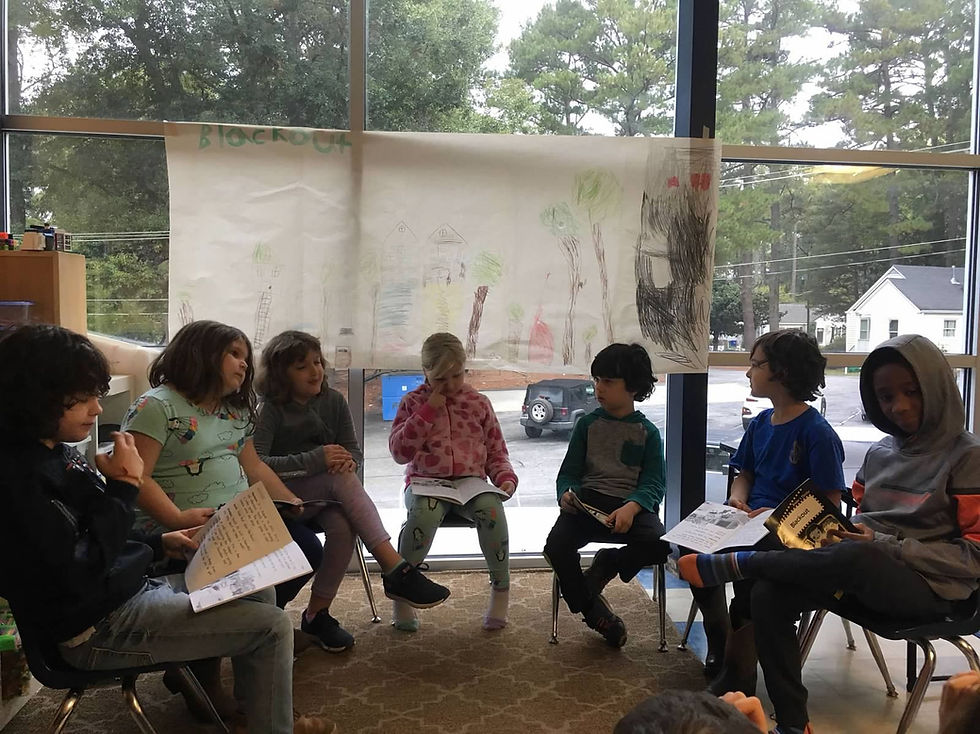Reading Workshop
Through story, we enter into dialogue with voices we would not otherwise encounter. Readers discover more about themselves and the world around them as they unlock more tools for engaging texts. Reading Workshops encourage students to build a range of strategies for understanding key elements of literature such as plot, character, and theme.
K-1:
“During the reading workshop this week, readers made self-to-text connections with a read aloud story. When readers make a self to text connection, they then form a deeper understanding of the text. As you read aloud with your children, ask them to stop and think about how this part of the story reminds them of something in their own life.”
2nd & 3rd grade:

“In our reading groups, we are learning how to use the context of the sentence to decode
what a word is likely to be. If we do not immediately recognize it, context can help determine the meaning of a word that might be new to readers.”
4th grade:
“This week we practiced using correct phrasing when reading complex sentences. Grouping words together by pausing appropriately between phrases, clauses, and sentences helps us make sense of what we are reading. We continue to develop decoding skills through word work and using context clues as an additional strategy.”
5th & 6th grade:
"Our students study 'mentor texts' not only to learn elements of craft, but also to make personal connections with what they are reading. The 5th and 6th grade class read a poem in celebration of 'discardable things' after hearing about the author's experience in the foster care system. One student even went on to try
her hand at creating her own poem in this style!"
7th & 8th grade:
"Readers will continue to analyze author's purpose and chosen themes by closely reading and annotating texts. They will then prepare for their first small group literature discussions over famous short stories by practicing close reading skills and generating meaningful questions.”
Writing Workshop
Sometimes the biggest gift learning environments can offer students is the dedicated space and time to practice developing their own voice. Daily writers’ workshops allow students to brainstorm topics, generate text, revise, edit, and give and receive constructive feedback.
K-1:
“Writers looked around the playground, classroom, and at home to find a seed story. The students orally shared their ideas for a new story each day and quickly began to write. Some students even went back to a story started earlier in the year to add those itsy-bitsy details. They are 'showing, not telling' to help readers visualize the setting, characters, and action of their writing. The stories are growing and blooming as they add details to each story.”
2nd & 3rd grade:
The students are doing a great job choosing topics to write about. We learned a new strategy to plan a story. The Storyboard Strategy involves sketching 5 or 6 simple pictures in sequence and then using the pictures as a plan for what will be written.”
4th grade:
“Students began writing their realistic fiction stories by creating a story arc, beginning with the exposition, rising to a climax, and ending with a resolution. Your creative children are forming fascinating characters dealing with real life problems.”
5th & 6th grade:
“Today, we watched a clip of 'Gortimer Gibbon’s Life on Normal Street', in which a student gets second place in a competition. The filmmakers literally slow down the video, blur out the background, and add slow eerie music as she walks back to her seat after “losing.” We talked about how this is a videographic method for literally slowing down at the heart of a story. The students practiced writing this way by creating an inner dialogue for the character during this slo-mo scene.”
7th & 8th grade:
"Writers are now in the midst of fantasy narrative brainstorming. This week, students are learning to mine story ideas from small moments in their own lives, lessons they wish others to hear, and settings that would add to an overall theme or mood they wish to convey. To further their in-class work, writers are developing these ideas at home with twenty minutes of nightly writing. Our mentor texts range from Frog and Toad narratives to Roald Dahl tales!”



















































Comments